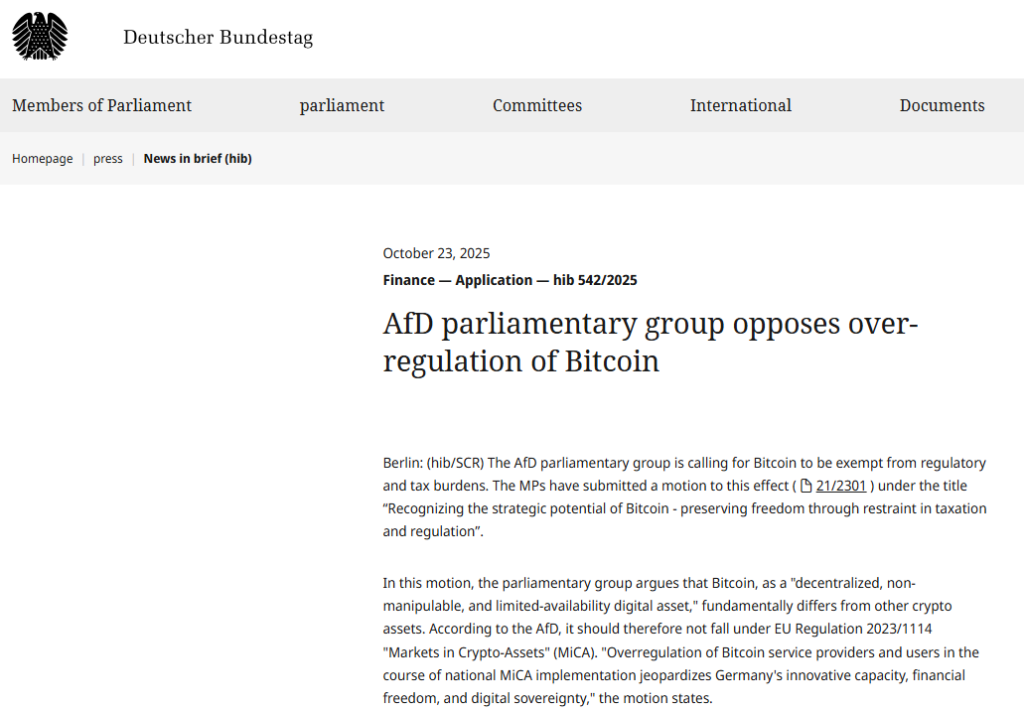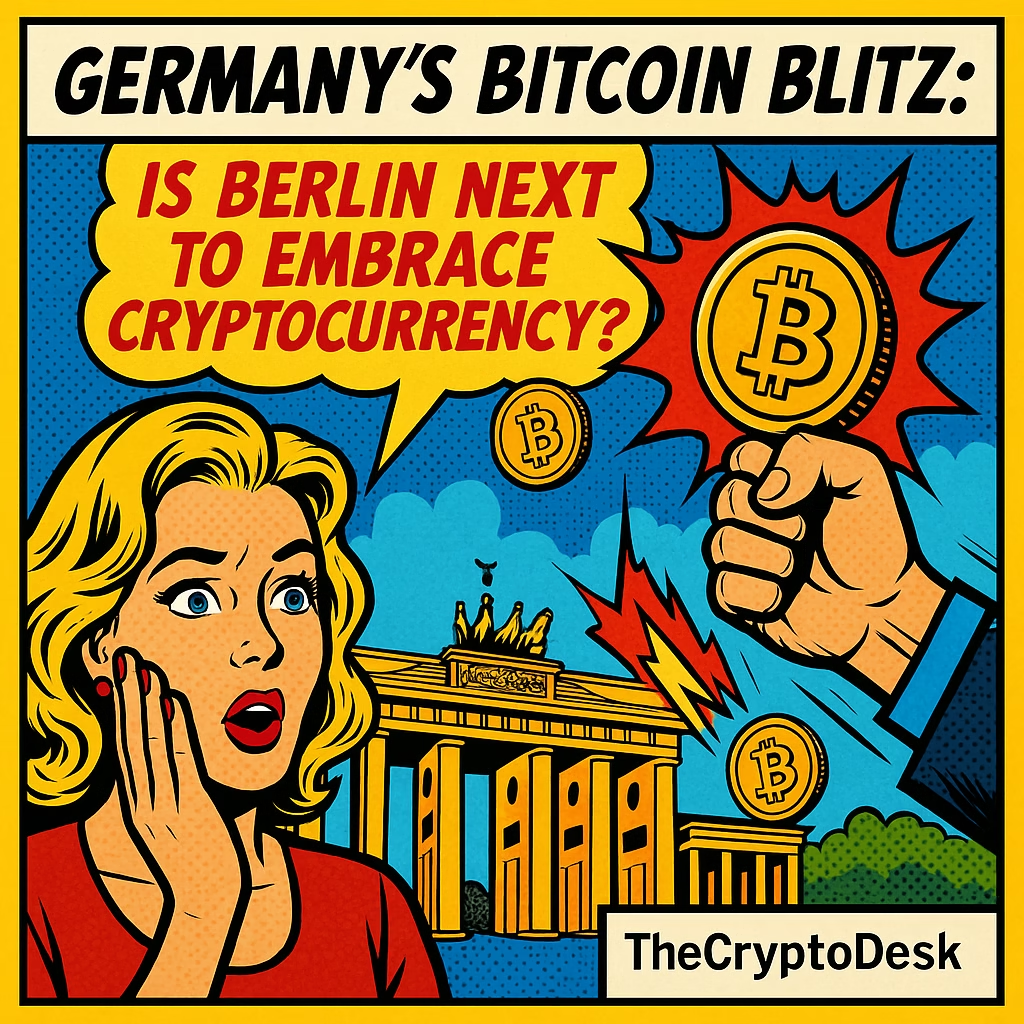The conversation surrounding Bitcoin in Germany is heating up, as lawmakers from various factions grapple with the implications of European Union (EU) regulations on the country’s financial landscape. With innovation at stake, a recent motion by the Alternative for Germany (AfD) party has sparked considerable debate, urging the government to reconsider its stance on Bitcoin regulation, particularly in relation to the EU’s Markets in Crypto-Assets (MiCA) framework.

In their proposal, titled “Recognizing the strategic potential of Bitcoin — preserving freedom through restraint in taxation and regulation,” AfD members emphasize the unique nature of Bitcoin as an asset class. They argue that Bitcoin, described as “decentralized, non-manipulable, and limited,” should avoid the regulatory burden imposed by MiCA. The motion expresses concerns that overregulation might lead to a mass exodus of capital and companies from Germany, ultimately harming the nation’s competitiveness and digital sovereignty.
But why does this debate matter? The ramifications of how Germany treats Bitcoin could set significant precedents across Europe, redefining digital currency’s role not only in national economies but also in the broader EU financial ecosystem. If Germany decides to recognize Bitcoin more favorably, it could encourage other nations to follow suit, fostering an environment of innovation and progress in blockchain technology.
Part of the argument presented by the AfD highlights Bitcoin’s technological and monetary characteristics, likening it more to digital gold than to traditional speculative tokens. The party is calling for practical changes, including the establishment of a 12-month tax-free holding period for Bitcoin, classifying private mining and lightning node activities as non-commercial, and issuing a strategic statement about recognizing Bitcoin as “free, digital money in the 21st century.” This recognition could have profound implications for Germany’s energy policy, digital freedoms, and overall monetary sovereignty.
Germany has already positioned itself as a leader in blockchain adoption, benefitting from a combination of national and EU regulations. The Federal Financial Supervisory Authority (BaFin) has taken an active role in overseeing crypto-asset service providers, ensuring compliance with anti-money laundering (AML) and know-your-customer (KYC) protocols. Since the implementation of MiCA, BaFin has licensed various crypto custodians and exchanges, making Germany a vital hub for regulated digital asset activities within the European Economic Area.
The transition period until December 30, 2025, allows existing crypto service providers time to adjust to the new regulations. So far, BaFin has issued nine MiCA licenses, more than any other European regulatory body, which emphasizes its commitment to fostering a secure environment for cryptocurrency in Germany.
The growing excitement around Bitcoin in Germany is particularly highlighted by recent developments in France. The French National Assembly has expressed its opposition to the European Central Bank’s proposed digital euro while advocating for Bitcoin and euro-based stablecoins as viable alternatives. This desire to explore decentralized money has resonated in both countries, pointing towards a potential rift in the EU concerning digital currencies.
🇫🇷 France Adopts Bitcoin: France’s National Assembly has adopted a resolution opposing the digital euro and endorsing Bitcoin. #France #Bitcoin #DigitalEuro pic.twitter.com/2evgXL5KFL— Cryptonews.com (@cryptonews) October 28, 2025
However, amidst these discussions, Germany’s Bundesbank President, Joachim Nagel, argues in favor of the digital euro, suggesting it’s critical for maintaining Europe’s financial sovereignty. The tension between advocating for a decentralized currency like Bitcoin and supporting a EU-regulated digital euro illustrates the complex landscape in which policymakers are navigating.
Adding to the intrigue, Germany’s enactment of its crypto policies has not been without controversy. In mid-2024, the government liquidated nearly 50,000 BTC seized during criminal investigations, a move that raised eyebrows given Bitcoin’s appreciation in value. By August 2025, the price of Bitcoin had skyrocketed, turning those holdings into a potential windfall of around $6 billion, a remarkable increase compared to the $2.9 billion realized at the time of sale. Bundestag member Joana Cotar has since advocated treating Bitcoin as a strategic reserve asset instead of hastily selling off these valuable resources.
The state of Germany’s cryptocurrency market remains robust, with data from Chainalysis indicating that the country recorded a staggering $219 billion in crypto transaction volume between July 2024 and June 2025, securing its position as one of Europe’s largest markets. Furthermore, the crypto user base is steadily growing, with projections suggesting that by the end of 2025, Germany could have around 27 million crypto users, half of whom belong to Generation Z or Millennials. Institutions are also taking notice; Deutsche Bank is gearing up to introduce a digital asset custody service by 2026, revealing a significant shift in mainstream financial institutions towards embracing cryptocurrencies.
As the debate around Bitcoin continues to intensify in Germany, it raises important questions about financial innovation, national sovereignty, and the future of digital money in Europe. Will Germany take a bold step towards a more crypto-friendly economy? The coming months will be crucial in shaping the country’s stance and potentially influencing the broader EU narrative on cryptocurrency. As the landscape evolves, staying informed and engaged will be vital for those invested in the world of digital assets.
